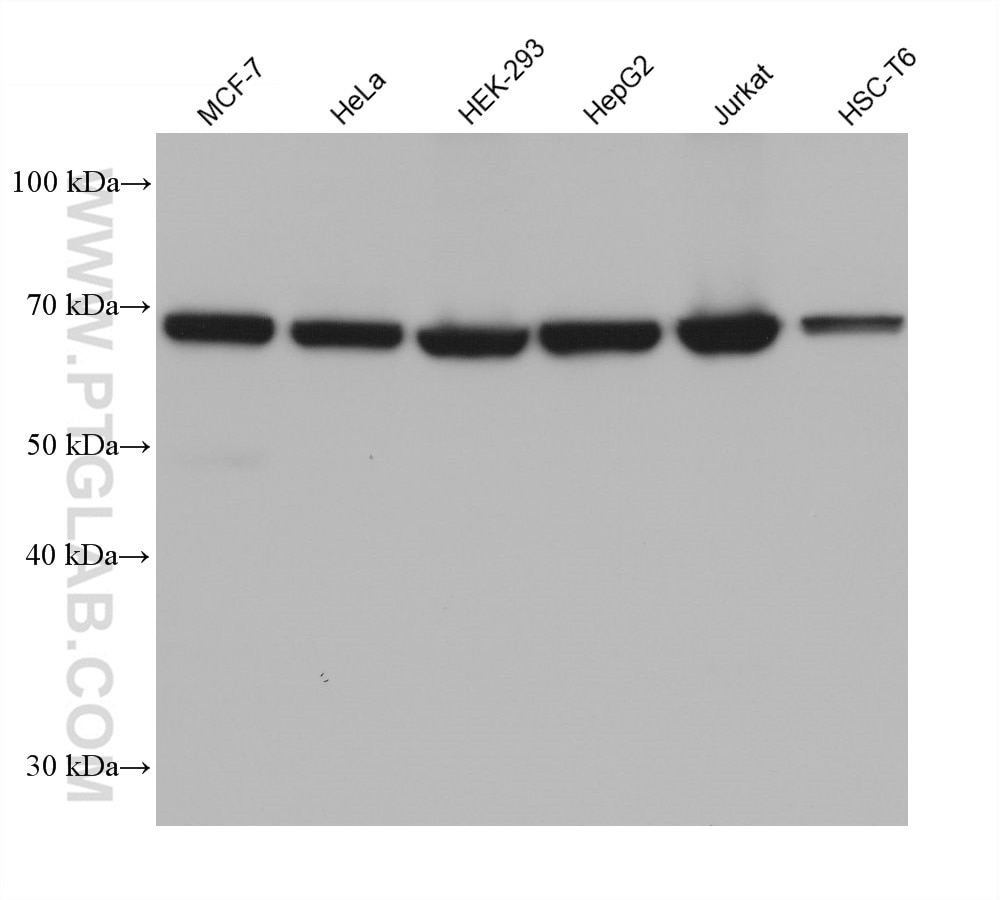Validation Data Gallery
Tested Applications
| Positive WB detected in | MCF-7 cells, HeLa cells, HEK-293 cells, HepG2 cells, Jurkat cells, HSC-T6 cells |
Recommended dilution
| Application | Dilution |
|---|---|
| Western Blot (WB) | WB : 1:5000-1:50000 |
| It is recommended that this reagent should be titrated in each testing system to obtain optimal results. | |
| Sample-dependent, Check data in validation data gallery. | |
Product Information
68534-1-Ig targets PRMT5 in WB, ELISA applications and shows reactivity with Human, rat samples.
| Tested Reactivity | Human, rat |
| Host / Isotype | Mouse / IgG1 |
| Class | Monoclonal |
| Type | Antibody |
| Immunogen | PRMT5 fusion protein Ag9678 相同性解析による交差性が予測される生物種 |
| Full Name | protein arginine methyltransferase 5 |
| Calculated molecular weight | 637 aa, 73 kDa |
| Observed molecular weight | 68 kDa |
| GenBank accession number | BC025979 |
| Gene Symbol | PRMT5 |
| Gene ID (NCBI) | 10419 |
| RRID | AB_3085242 |
| Conjugate | Unconjugated |
| Form | Liquid |
| Purification Method | Protein G purification |
| UNIPROT ID | O14744 |
| Storage Buffer | PBS with 0.02% sodium azide and 50% glycerol , pH 7.3 |
| Storage Conditions | Store at -20°C. Stable for one year after shipment. Aliquoting is unnecessary for -20oC storage. |
Background Information
PRMT5 is a Type II enzyme that catalyzes arginine monomethylation and symmetric dimethylation (Rme1 and Rme2s). The many targets of PRMT5 include ribosomal proteins, the histone chaperone nucleoplasmin, p53, and histones. PRMT5 is frequently observed in a complex with the cofactor, methylosome protein 50 (MEP50), which is required for PRMT5 activity. PRMT5 is upregulated in several human malignancies, including lymphomas, lung cancer, breast cancer and colorectal cancer.
Protocols
| Product Specific Protocols | |
|---|---|
| WB protocol for PRMT5 antibody 68534-1-Ig | Download protocol |
| Standard Protocols | |
|---|---|
| Click here to view our Standard Protocols |
